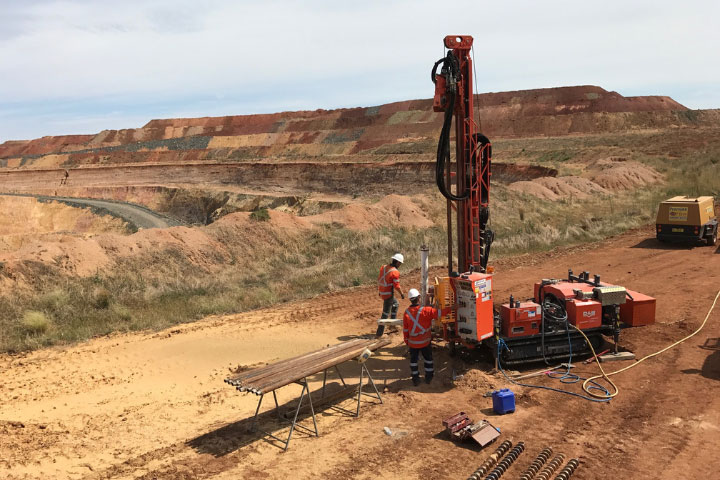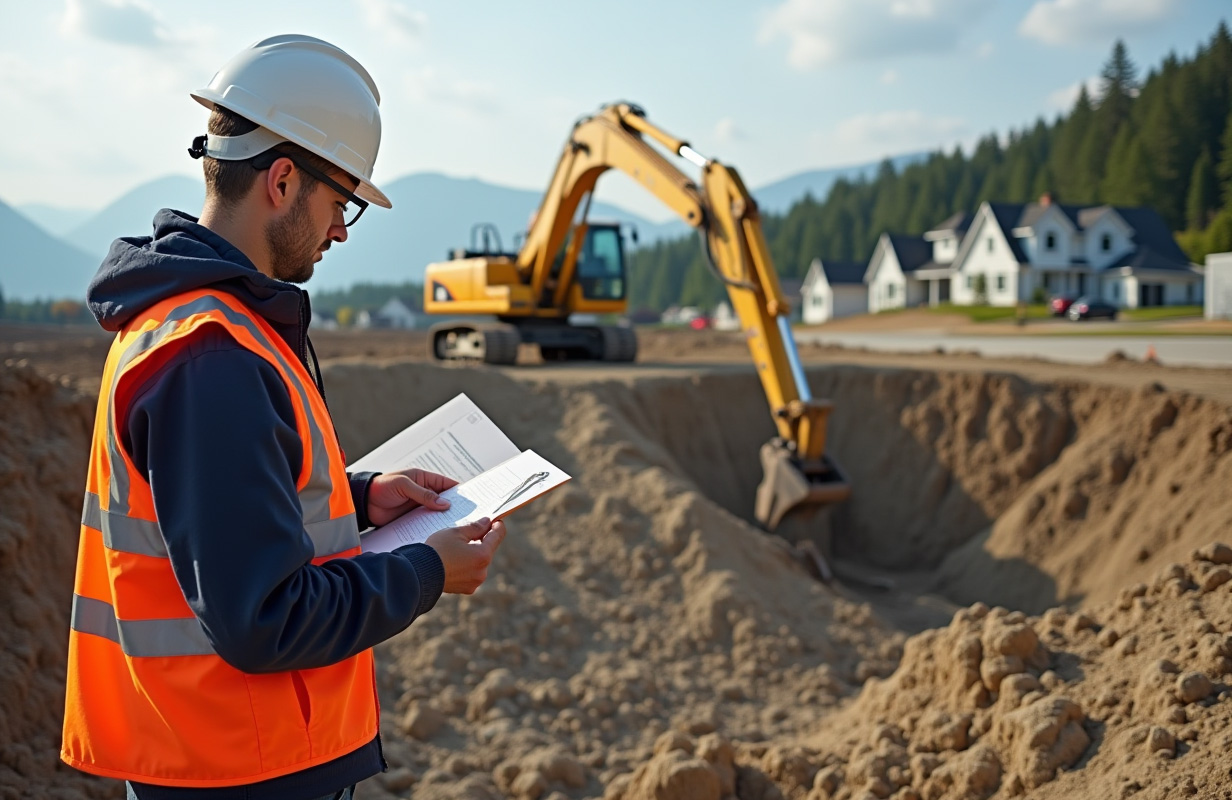How a Geotechnical Specialist Can Guarantee the Success of Your Building Structures
How a Geotechnical Specialist Can Guarantee the Success of Your Building Structures
Blog Article
The Value of Geotechnical Design in Attending To Environmental Obstacles and Enhancing Building And Construction Security
Geotechnical engineering offers as a foundation in the crossway of ecological stewardship and building security, supplying important insights right into the behavior of dirt and rock under numerous conditions. By executing strategic site investigations and tailored mitigation steps, geotechnical engineers play an important role in safeguarding both human lives and environmental honesty.

Duty of Geotechnical Design
Geotechnical engineering plays a critical duty in the style and building of facilities by attending to the actions of dirt and rock materials under numerous conditions. This field of engineering is important for recognizing the interaction in between structures and the ground, that includes establishing the load-bearing capacity of dirt, examining security, and forecasting potential settlement or failure.
Geotechnical designers are accountable for carrying out website examinations, which involve tasting and screening dirt and rock to gather information on their chemical and physical residential or commercial properties. This info is crucial for making structures, keeping wall surfaces, and other earth-retaining structures that ensure security and longevity. Furthermore, geotechnical design educates the choice of appropriate construction approaches and materials, thus lessening risks associated with soil habits.
Moreover, the integration of geotechnical engineering principles right into urban preparation and environmental administration is essential for addressing obstacles such as ground contamination and groundwater administration. By recognizing geotechnical elements, designers can establish sustainable solutions that enhance the durability of facilities against natural hazards, while likewise advertising environmental stewardship. Eventually, the duty of geotechnical design is crucial for achieving safe, long lasting, and environmentally conscious building practices.
Dirt Erosion Reduction
Dirt disintegration poses a significant danger to both ecological stability and framework stability, impacting about 24 billion tons of fertile dirt lost every year worldwide. This phenomenon is worsened by elements such as logging, urbanization, and bad farming practices. Geotechnical engineering plays a crucial role in establishing reliable soil disintegration reduction strategies that secure both the environment and building and construction jobs.
One technique involves the execution of erosion control approaches such as plant life growing, which maintains dirt through root systems. In addition, the construction of retaining terraces and walls can successfully minimize surface runoff and safeguard prone areas from erosion. Proper drainage design is additionally important; it minimizes water accumulation and guides excess overflow far from essential frameworks.
Furthermore, geotechnical engineers use dirt stabilization techniques, such as the application of geotextiles and eco-friendly mats, to improve soil cohesion and stop destruction - all about geotechnical engineering. Regular tracking and analysis of erosion-prone sites enable timely treatments, guaranteeing lasting sustainability. By incorporating these approaches, geotechnical engineering not just mitigates the effects of dirt erosion yet likewise adds to the durability of framework versus ecological obstacles, inevitably fostering a much safer and a lot more lasting built atmosphere
Groundwater Defense Strategies
Groundwater functions as an important source for alcohol consumption water, farming, and industrial processes, making its defense vital for ecological sustainability and public wellness. Reliable groundwater security methods are crucial in reducing contamination risks and making certain the longevity of this source.

Normal surveillance of groundwater high quality is additionally vital, enabling very early detection of contamination sources and assisting in timely remediation initiatives. Employing innovative modern technologies, such as geophysical studies and remote sensing, aids in determining possible hazards to groundwater gets.
In addition, public education and learning and stakeholder engagement are vital, cultivating neighborhood assistance for groundwater defense campaigns. about geotechnical engineering. By incorporating governing steps, technological improvements, and community involvement, we can develop a comprehensive structure that safeguards groundwater sources while advertising lasting development and building techniques
Landslide Danger Monitoring
Landslides position considerable threats to both human security and framework, making reliable risk management methods crucial. Geotechnical design plays a critical function in identifying, examining, and mitigating landslide risks. A detailed understanding of slope security, dirt mechanics, and hydrology is crucial for creating reliable danger monitoring strategies.
The very first step in landslide risk administration involves extensive site examinations, that include geological mapping and dirt testing. These examinations help designers review the capacity for landslides by recognizing critical aspects such as incline angles, soil make-up, and water material. Making use of advanced technologies such as remote picking up and geophysical studies can boost the accuracy of these assessments.
When risks are recognized, proper reduction steps can be applied. These might include engineering solutions such as retaining walls, water drainage systems, and incline stabilization strategies. Checking systems must be established to detect indicators of ground movement and changes in water levels, permitting for aggressive interventions.

Enhancing Construction Safety And Security
Construction sites often offer a myriad of threats that can jeopardize employee security and job integrity. Geotechnical design plays a critical duty in improving construction safety by giving crucial insights into subsurface conditions. Through comprehensive soil and rock analysis, geotechnical engineers can determine prospective risks, such as soil instability, groundwater concerns, and seismic vulnerabilities, which may jeopardize the safety and security of building activities.
Executing geotechnical remedies, such as proper learn the facts here now foundation layout and the usage of retaining structures, reduces these threats considerably. These services not just make sure the security of the frameworks being built but additionally produce a much safer working setting for construction personnel.
Additionally, cultivating a culture of security via training and adherence to established websites security protocols further improves building site safety and security. By incorporating geotechnical expertise right into the planning and implementation stages, building tasks can accomplish higher safety criteria, ultimately securing employees and making certain successful task completion.
Verdict
Finally, geotechnical engineering serves as a vital discipline in tackling environmental difficulties and promoting construction security. With effective dirt disintegration reduction, groundwater protection approaches, and landslide threat administration, geotechnical engineers contribute to the growth of durable infrastructure. The assimilation of these techniques fosters a much safer building and construction environment and enhances the sustainability of civil design jobs. Eventually, the know-how of geotechnical designers is important in safeguarding both natural deposits and human lives versus potential dangers.
Geotechnical engineering offers as a cornerstone in the junction of ecological stewardship and construction safety and security, supplying important understandings right into the behavior of dirt and rock under different conditions. Geotechnical design notifies the option of proper construction methods and materials, thus reducing risks connected with dirt behavior.
Geotechnical design plays an essential function in establishing effective soil erosion mitigation methods that protect both the atmosphere and building jobs.
In addition, geotechnical engineers employ dirt stabilization methods, such as the application of geotextiles and eco-friendly floor coverings, to improve dirt cohesion and avoid deterioration. Through comprehensive soil and rock analysis, geotechnical designers can recognize prospective dangers, such as dirt instability, groundwater concerns, and seismic vulnerabilities, which may endanger the safety and security of building tasks.
Report this page